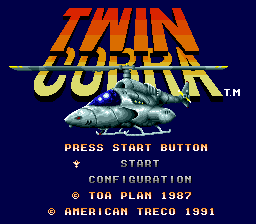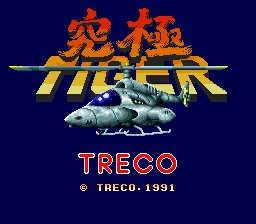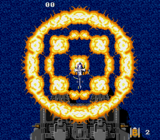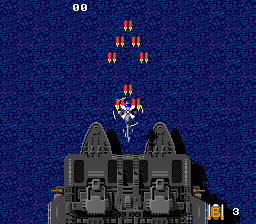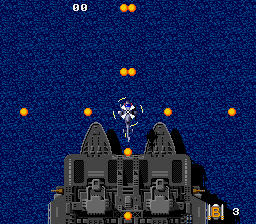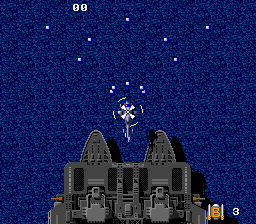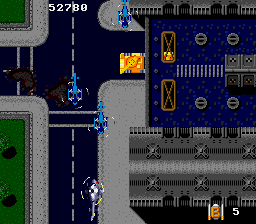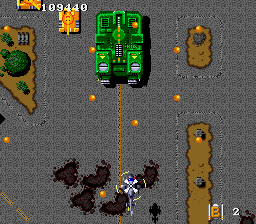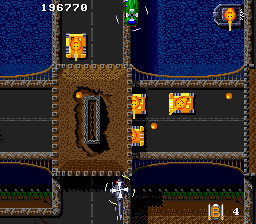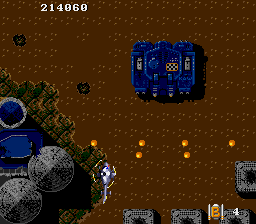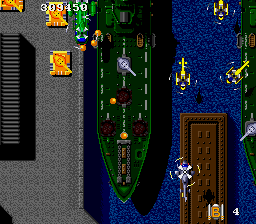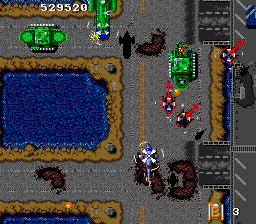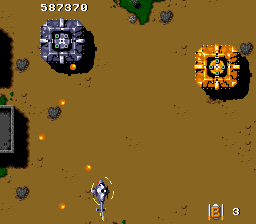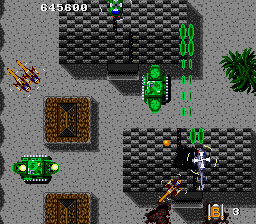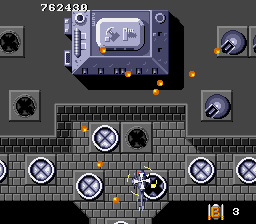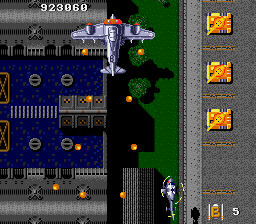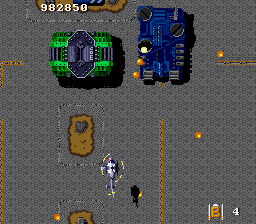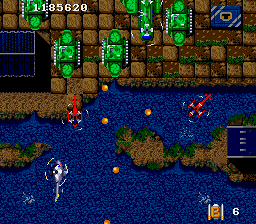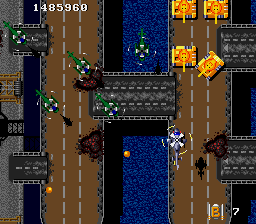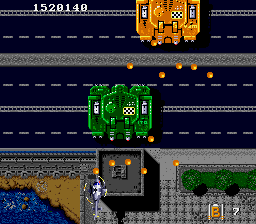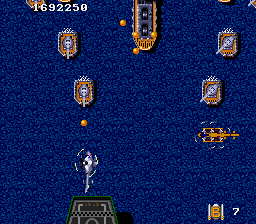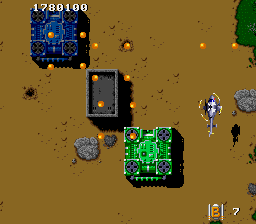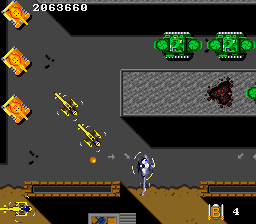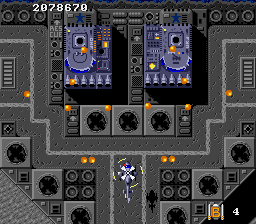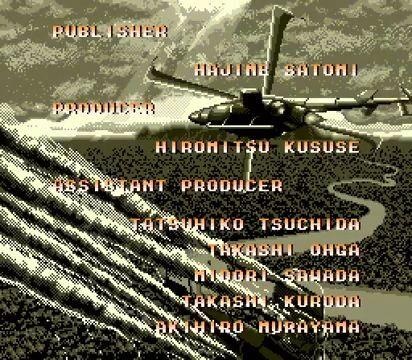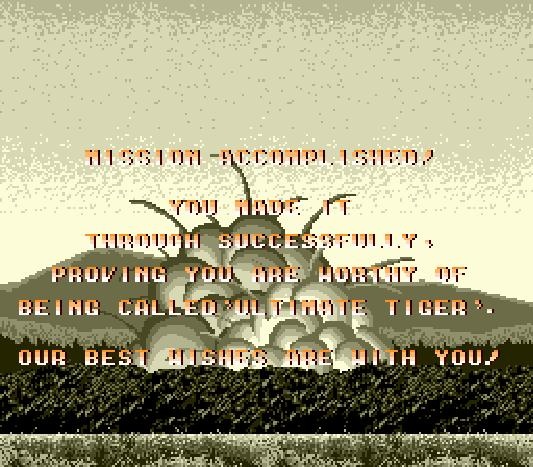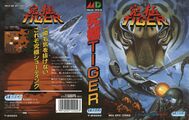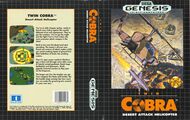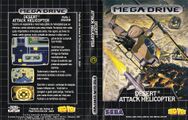Twin Cobra
From Sega Retro
- For the 2024 re-release by Retro-bit, see Twin Cobra Collector's Edition.
| ||||||||||||||||||||
| Twin Cobra | ||||||||||||||||||||
|---|---|---|---|---|---|---|---|---|---|---|---|---|---|---|---|---|---|---|---|---|
| System(s): Sega Mega Drive | ||||||||||||||||||||
| Publisher: Sega of America (US), Treco (JP), Tec Toy (BR) | ||||||||||||||||||||
| Developer: GRC | ||||||||||||||||||||
| Distributor: Tec Toy (BR) | ||||||||||||||||||||
| Licensor: Toaplan, American Treco (US) | ||||||||||||||||||||
| Original system(s): Arcade boards | ||||||||||||||||||||
| Developer(s) of original games: Toaplan | ||||||||||||||||||||
| Genre: Shooting[1] | ||||||||||||||||||||
| Number of players: 1 | ||||||||||||||||||||
| ||||||||||||||||||||
|
Twin Cobra, known in Japan as Kyuukyoku Tiger (究極タイガー), is a Sega Mega Drive vertical shoot-'em-up developed by GRC. A port of the titular 1987 Toaplan arcade game Twin Cobra, it was first published in Japan by Treco in Feburary 1991[1], and was later brought to the United States by Sega of America four months later.[4][5] Some time later, it was also also published in Brazil by Tec Toy.
Contents
Gameplay
The game is a military-themed vertical shoot-'em-up in which players take control of the titular attack helicopter through ten increasingly difficult levels, each with a boss at the end that must be fought before progressing any further, in order to defeat an assortment of military enemy forces like tanks, battleships, and artillery as the main objective. Players control the craft over a constantly scrolling background, and the scenery never stops moving until a helipad is reached.
The Twin Cobra is moved in any direction using the D-Pad. The playable area is somewhat wider than the screen, so moving to the left and right sides of the screen scrolls the view sideways slightly. The Twin Cobra fires its primary weapon with ![]() , which can be held for rapid-fire (though using a rapid-fire controller can be faster). This weapon has unlimited ammunition and can be powered up by collecting items. It is additionally armed with a limited supply of bombs, which are dropped with
, which can be held for rapid-fire (though using a rapid-fire controller can be faster). This weapon has unlimited ammunition and can be powered up by collecting items. It is additionally armed with a limited supply of bombs, which are dropped with ![]() or
or ![]() . These bombs have a large radius and do high damage, in addition to absorbing all bullets while the explosion lasts. There is a small delay between dropping the bomb and the bomb detonating.
. These bombs have a large radius and do high damage, in addition to absorbing all bullets while the explosion lasts. There is a small delay between dropping the bomb and the bomb detonating.
The Twin Cobra is destroyed if it takes damage from an enemy, and it respawns at a predetermined checkpoint, with the starting weapon at baseline strength and with the starting complement of three bombs. The game ends if the player runs out of lives, but it can be continued as long as there are credits remaining. The player earns an extra life at 70,000 and 200,000 points and then every 200,000 points after that. This can be changed to 50,000 and 150,000 points or to 10,000 points only in the options, as well as changing the starting lives to 3, 4, or 5. There are eight selectable difficulty levels (Easy A, B, C, and D and Hard A, B, C, and D), which affects the number of credits given.
After completing the last stage, as with previous titles from Toaplan, the game begins again with the second loop, increasing in difficulty.
Weapons
| Red | |
|---|---|
| The starting weapon. A straight shot that becomes wider as it powers up. | |
| Green | |
| A narrow, strong laser. | |
| Yellow | |
| A cross-shaped shot that fires in the four cardinal directions. | |
| Blue | |
| A spreadshot. |
Items
| S | |
|---|---|
| Powers up the currently equipped weapon. | |
| B | |
| Adds another bomb to the supply. | |
| P | |
| Awards 3,000 bonus points at the end of the stage. These bonuses are lost if the player loses a life. | |
| Weapon | |
| Equips a different weapon. The item cycles through the four different colors, each representing a different weapon. | |
| 1-Up | |
| Gives the player an extra life. |
Stages
| Stage 1 | |
|---|---|
| Stage 2 | |
| Stage 3 | |
| Stage 4 | |
| Stage 5 | |
| Stage 6 | |
| Stage 7 | |
| Stage 8 | |
| Stage 9 | |
| Stage 10 | |
History
Legacy
The game was also ported to the NES, FM Towns, and PlayStation. The PlayStation port, part of Toaplan Shooting Battle Vol.1, is the most faithful conversion.
In 1995, it received a sequel, Twin Cobra II or Kyuukyoku Tiger II, which would be ported exclusively to the Sega Saturn and released in Japan as Kyuukyoku Tiger II Plus.
A boss in Namco's shoot-'em-up Dangerous Seed is called "Ultimate Tiger", which is a direct translation of the Japanese name of Twin Cobra. This could be a deliberate reference.
Versions
By default, the Mega Drive port of Twin Cobra is harder than its arcade counterpart, but the difficulty can be adjusted in the options menu. Its overall presentation (complete with the "Insert Coin" screen), gameplay, levels layout and enemy patterns are faithful to the arcade original, unlike the rival PC Engine version, which stripped its gameplay down and offers simplified presentation and stage design.
The Mega Drive Twin Cobra has a very simplistic way of handling colour, choosing a 64-colour palette at the start of the game and sticking with it regardless of what is happening on screen. This leads to some curious design choices, such as the tanks in Stage 1 being bright yellow, as their palette is shared with explosions. On top of this, 16 of those colours are reserved for hit confirmation effects (yellow/red flashing when hitting an enemy), giving even less choice for stages and objects.
The helicopter in all home versions of the game is grey as opposed to the original red colour scheme. There is also some noticeable load times before boss fights
Localised names
| Language | Localised Name | English Translation |
|---|---|---|
| English (US) | Twin Cobra | Twin Cobra |
| Japanese | 究極タイガー | Kyuukyoku Tiger |
| Portuguese (Brazil) | Desert Attack Helicopter | Desert Attack Helicopter |
This Mega Drive variant of the game is slightly misleading. The name "Twin Cobra" (or Twin Cobra: Desert Attack Helicopter as listed on the packaging) originates from the localised arcade name for Kyuukyoku Tiger, but the "twin" implies "two", when it is in fact only a one-player game. In Japan, the arcade Kyuukyoku Tiger was originally released in a single-player only-form - a product which did not make it to the US, but is what this Mega Drive port is derived from.
In Brazil, this was partially rectified by simply calling the game Desert Attack Helicopter on its packaging, though it uses the Twin Cobra name in-game.
Production credits
Kyuukyoku Tiger
- Publisher: Hajime Satomi
- Producer: Hiromitsu Kususe
- Assistant Producer: Tatsuhiko Tsuchida, Takashi Ohga, Midori Sawada, Takashi Kuroda, Akihiro Murayama
- Program Designer: Hyakumangoku Hamada, Oshiete Kawacyan
- Art Creator: Numataroh, Etoh Shiwasu, Kencyan Arumon Mark-2, Harada Riku-Shicyoh, Arumon Puls, Hashiuri Yuki, Kidokoro Mai
- Music Arranger: Raika no Papa
- Super Data Maker: Dotsukanpo Itoh
- Executive Director: Yoshiaki Sawada
- Special Thanks: Damenanoyo-N Shigecyan, Silpheed, Silence Takahashi, Dadida Syohji, Tetorisu Kudasai Maccyan, Bakkin Tamayama, Yukimi Papa, Urakureani Man 7, Egawa Bucyoh, Yamanaka San, Hex Dec Bin Imoto
- Presented by: Treco
- © 1991 All Rights Reserved
Twin Cobra
- Publisher: Hajime Satomi
- Producer: Hiromitsu Kususe
- Assistant Producer: Tatsuhiko Tsuchida, Takashi Ohga, Midori Sawada, Takashi Kuroda, Akihiro Murayama
- Program Designer: Hyakumangoku Hamada, Oshiete Kawacyan
- Art Creator: Numataroh, Etoh Shiwasu, Kencyan Arumon Mark-2, Harada Riku-Shicyoh, Arumon Puls, Hashiuri Yuki, Kidokoro Mai
- Music Arranger: Raika no Papa
- Super Data Maker: Dotsukanpo Itoh
- Executive Director: Yoshiaki Sawada
- Special Thanks: Damenanoyo-N Shigecyan, Silpheed, Silence Takahashi, Dadida Syohji, Tetorisu Kudasai Maccyan, Bakkin Tamayama, Yukimi Papa, Urakureani Man 7, Egawa Bucyoh, Yamanaka San, Hex Dec Bin Imoto
- Presented by: Sega Enterprises Ltd.
- © 1991 All Rights Reserved
Magazine articles
- Main article: Twin Cobra/Magazine articles.
Promotional material
also published in:
- Beep! MegaDrive (JP) #1991-01: "January 1991" (1990-12-08)[8]
- Beep! MegaDrive (JP) #1991-02: "February 1991" (1991-01-08)[9]
- Mega Drive Fan (JP) #12: "January 1991" (1990-12-08)[10]
- Mega Drive Fan (JP) #13: "February 1991" (1991-01-08)[11]
also published in:
- Mega Drive Fan (JP) #14: "March 1991" (1991-02-08)[12]
Physical scans
| 65 | |
|---|---|
| Based on 31 reviews | |
Technical information
- Main article: Twin Cobra/Technical information.
References
NEC Retro has more information related to Kyuukyoku Tiger
|
- ↑ 1.0 1.1 1.2 https://sega.jp/history/hard/megadrive/software_l.html (Wayback Machine: 2020-07-02 23:21)
- ↑ File:TwinCobra MD JP Box.jpg
- ↑ Beep! MegaDrive, "December 1990" (JP; 1990-11-08), page 21
- ↑ 4.0 4.1 4.2 Electronic Gaming Monthly, "June 1991" (US; 1991-xx-xx), page 22
- ↑ 5.0 5.1 GamePro, "June 1991" (US; 1991-xx-xx), page 42
- ↑ File:Kyuukyoku Tiger MD credits.pdf
- ↑ File:Twin Cobra MD credits.pdf
- ↑ Beep! MegaDrive, "January 1991" (JP; 1990-12-08), page 16
- ↑ Beep! MegaDrive, "February 1991" (JP; 1991-01-08), page 16
- ↑ Mega Drive Fan, "January 1991" (JP; 1990-12-08), page 38
- ↑ Mega Drive Fan, "February 1991" (JP; 1991-01-08), page 42
- ↑ Mega Drive Fan, "March 1991" (JP; 1991-02-08), page 105
- ↑ 1700 igr dlya Sega, "" (RU; 2001-xx-xx), page 322
- ↑ 1700 igr dlya Sega, "" (RU; 2001-xx-xx), page 252
- ↑ Aktueller Software Markt, "Mai 1991" (DE; 1991-04-26), page 128
- ↑ Beep! MegaDrive, "March 1991" (JP; 1991-02-08), page 34
- ↑ The Complete Guide to Sega, "" (UK; 1991-05-xx), page 38
- ↑ Console XS, "June/July 1992" (UK; 1992-04-23), page 136
- ↑ Computer & Video Games, "May 1991" (UK; 1991-04-14), page 76
- ↑ Entsiklopediya luchshikh igr Sega. Vypusk 1, "" (RU; 1999-xx-xx), page 365
- ↑ Mean Machines: The Essential Sega Guide, "" (UK; 1993-11-18), page 113
- ↑ Famitsu, "" (JP; 1991-0x-xx), page 1
- ↑ Hippon Super, "March 1991" (JP; 1991-02-04), page 42
- ↑ Joystick, "Avril 1991" (FR; 1991-0x-xx), page 127
- ↑ 25.0 25.1 Sega Mega Drive Advanced Gaming, "January 1993" (UK; 199x-xx-xx), page 95
- ↑ Mega Drive Fan, "May 1991" (JP; 1991-04-08), page 95
- ↑ Mega Play, "May/June 1991" (US; 1991-0x-xx), page 43
- ↑ MegaTech, "Xmas 1991" (UK; 1991-12-06), page 81
- ↑ Mean Machines Sega, "October 1992" (UK; 1992-09-xx), page 142
- ↑ Power Play, "5/91" (DE; 1991-04-12), page 139
- ↑ 31.0 31.1 Sega Power, "October 1991" (UK; 1991-09-05), page 55
- ↑ Sega Pro, "April 1992" (UK; 1992-03-19), page 31
- ↑ 33.0 33.1 Sega Pro, "April 1993" (UK; 1993-03-11), page 68
- ↑ Sega Force, "August 1992" (UK; 1992-07-09), page 90
- ↑ Sega Saturn Magazine, "September 1995" (JP; 1995-08-08), page 87
- ↑ Tilt, "Juin 1991" (FR; 1991-0x-xx), page 75
- ↑ Tricks 16 bit, "Tricks Sega Gold 800 igr" (RU; 1998-03-20), page 208
- ↑ Tricks 16 bit, "Tricks Sega Gold 800 igr" (RU; 1998-03-20), page 27
- ↑ Video Games, "2/91" (DE; 1991-06-07), page 91
| Twin Cobra | |
|---|---|
|
Main page | Comparisons | Maps | Hidden content | Magazine articles | Reception | Region coding | Technical information | |
